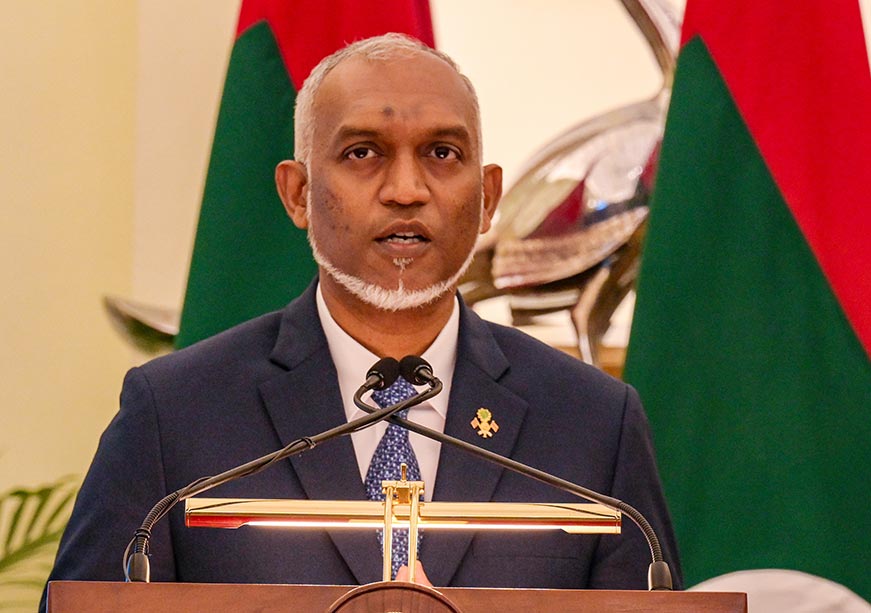-
CENTRES
Progammes & Centres
Location
President Muizzu’s problematic urban centres’ plan contradicts the Maldives’ democratic and decentralised frameworks

Image Source: Getty
Earlier this month, President Mohammed Muizzu announced seven new urban centres, as a part of the Maldives' Sustainable Regional Development Policy. The announcement drew criticism from political factions and development planners alike. The choice of centres lacks any discernible justification, as they bypass the fundamental planning checklist, including geographic accessibility, economic viability, historical context, and demographic shifts. With no public consultation before the announcement, unclear selection criteria, and a clear misalignment with these essential prerequisites, serious questions arise: Is Maldives' long-term development planning now subject to political expediency, or worse, erratic decision-making?
This unilateral approach to urban development, bypassing established planning frameworks and stakeholder engagement signals a concerning gap between democratic principles and development planning.
Few will dispute the necessity of decentralised, regionalised development in the Maldives. The scattered islands and vast waters, and the country's fiscal reality make infrastructure and service provision to each inhabited island logistically and economically unviable. Climate change adds further urgency. Increasingly unpredictable weather and sea conditions severely disrupt inter-island transport, making consolidated service delivery increasingly fraught. Historical settlement trends provide context for community development, while demographic shifts indicate where urban growth can be sustainably supported. Therefore, the need for “centralised-decentralisation” or a hub-and-spoke model of development, has long been recognised by both policymakers and politicians. Brushing past these dynamics deepens existing fault lines in the following ways:
Historical settlement trends provide context for community development, while demographic shifts indicate where urban growth can be sustainably supported.
Demographic pressures in Malé: 41 percent of the nation's population is concentrated in the Greater Malé Area, with projections showing that this concentration will reach 64 percent by 2054. Combined with about 40 percent of the total foreign population also being concentrated in Malé, the capital faces severe and multifaceted strain. This density has led to a housing crisis with soaring rent and overcrowded living conditions. Essential infrastructure systems, from waste management to electricity, are under intense pressure. Healthcare facilities are overtaxed, education systems struggle with capacity, and job creation for locals lags behind the need. These pressures affect both physical and mental well-being, particularly impacting vulnerable groups. Maintaining social cohesion and providing sufficient resources to preserve the human dignity of both local and migrant populations pose escalating challenges.
The hollowing out of island communities: The exodus to Malé threatens the very viability of island life. Maldives Census 2022 reveals that in 13 islands, more than 50 percent of the registered population now lives in Malé, while another 16 islands have lost 40-49 percent of their residents, and several smaller islands are expected to have populations below 1,000. This demographic shift fundamentally undermines the islands' productive capacity and economic viability. The remaining elderly population faces reduced care support and diminishing access to basic services. Local economies weaken as the consumer base shrinks and skilled workers depart, making it increasingly difficult to sustain even basic economic activity. This creates a self-reinforcing cycle where each departure makes the island less and less viable for those who remain.
Gender and community sustainability: Census data shows more than half of the population in Malé are migrants, with women now predominating among these migrant flows. Women relocate to access higher education, employment opportunities, and for family duties. This creates a compound effect where the remaining women face increased care responsibilities with decreased support networks. Any meaningful urban development strategy must address these gendered gaps in outer islands.
Local economies weaken as the consumer base shrinks and skilled workers depart, making it increasingly difficult to sustain even basic economic activity.
Climate vulnerability and connectivity: Escalating weather and oceanic variability are fundamentally impacting habitability. More frequent rough seas affect the transport of goods and people and also the essential supply chains for food, medicine, and trade. Communities already struggling with limited resources face growing isolation during adverse weather. The urban centre designation must consider immediate accessibility, emergency preparedness and long-term climate resilience, including the viability of maintaining reliable transport links and other infrastructure as weather conditions shift.
The newly announced urban centres (a part of the Sustainable Regional Development Policy) are: Ungoofaaru (Raa atoll), Eydhafushi (Baa atoll), Naifaru (Lhaviyani atoll), Mahibadhoo (Alif Dhaalu atoll), Nilandhoo (Faafu atoll), Kudahuvadhoo (Dhaalu atoll), and Fonadhoo (Laamu atoll). The policy envisions these centres as regional hubs providing comprehensive services including healthcare, education, and economic opportunities.
However, implementation raises several concerns, and the scepticism surrounding the announcement stems not from the concept but from concerns about both the chosen islands and the process behind their selection:
The plan bypasses the country's largest population centres, most notably the entirety of Addu, all of Huvadhoo Atoll, and Thiladhunmathi, including existing urban centres in those atolls. Instead, several designated islands are either small in population or face spatial constraints, raising questions about their capacity and viability to serve as regional hubs. The announced groupings also raise significant accessibility questions through its combination of relatively distant atolls; for instance, the residents from Huvadhoo and Addu have to travel to Laamu for essential services. This proposition contradicts the very purpose of regional development, making their selection seem almost absurd.
The plan bypasses the country's largest population centres, most notably the entirety of Addu, all of Huvadhoo Atoll, and Thiladhunmathi, including existing urban centres in those atolls.
The political undertones of certain selections are hard to ignore: choosing Fonadhoo over the much larger, more populous Gan in Laamu atoll, and elevating the relatively small Nilandhoo in the Faafu atoll to urban centre status (where the President's sister serves as Member of Parliament). Both decisions appear to favour political allies. Such choices leave little room for doubt about the actual criteria driving these selections.
The irony of this top-down approach lies in how it fundamentally contradicts the Maldives' own decentralisation framework. By bypassing local and atoll councils and limiting stakeholder debate, the administration is effectively dismantling the architecture of local governance. Local councils, with their intimate understanding of local needs and community aspirations, should be at the forefront of this debate. Their exclusion, coupled with the absence of broader consultation with policymakers and development experts, has deprived the process of both the local insight and the strategic vision necessary to align these urban centres with the nation's development trajectory. This perspective is essential for ensuring that these hubs serve as sustainable catalysts for regional growth, rather than becoming isolated, and eventually abandoned infrastructure projects.
The urban centres’ controversy reflects a broader pattern of increasingly centralised and unilateral decision-making under the Muizzu administration. A year into his presidency, Muizzu appears to be systematically and unmistakably consolidating power. The primary mechanism for this consolidation is commanding a parliamentary majority, which enables policy implementation without meaningful scrutiny. Constitutional amendments that weaken MP independence through stringent anti-defection measures, proposed changes to grant the President sweeping authority over national planning, parallel efforts to restrict press freedom through new media legislation, and laws that bypass local councils, effectively negating their constitutional mandate, are recent examples. These are alarming signs of a widening democratic vacuum where vital debate is systematically excluded in matters of national consequence. The urban centre’s designation exemplifies this deficit.
With traditional donors reducing funding across the board due to global economic pressures and shifting priorities, Maldives cannot afford to alienate partners through opaque governance and decree-based decisions, jeopardising access to remaining resources.
Such governance by decree carries significant risks beyond domestic democratic erosion. Traditional donors and multilateral institutions will be wary of opaque projects. This is particularly concerning given the assistance and investment needed for the scale of Maldives' current debt situation. With traditional donors reducing funding across the board due to global economic pressures and shifting priorities, Maldives cannot afford to alienate partners through opaque governance and decree-based decisions, jeopardising access to remaining resources. The resultant financing constraints force a reliance on less favourable credit terms, exacerbating the country's debt vulnerabilities and threatening its development trajectory.
The government must take immediate action to restore the democratic mandate by suspending current urban centre designations pending review, establishing a transparent and evidence-based framework conducting wide consultation and creating meaningful participation with stakeholders and the public (including development planners), and aligning selections with national development strategies, demographic dividends, sustainable development goals and climate plans.
Eva Abdulla is the Chairperson of The Maldives Policy Think Tank.
The views expressed above belong to the author(s). ORF research and analyses now available on Telegram! Click here to access our curated content — blogs, longforms and interviews.

Eva Abdulla, Chairperson of The Maldives Policy Think Tank, is the former Deputy Speaker of the Maldives, and was a three- term elected member of ...
Read More +